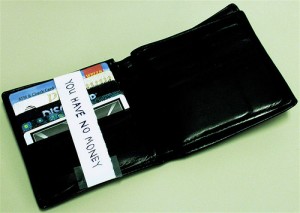What would your future-you have to say to you?
The no-pants guide to spending, saving, and thriving in the real world.
What would your future-you have to say to you?

In April, my wife and I decided that debt was done. We have hopefully closed that chapter in our lives. I borrowed, then purchased, The Total Money Makeover by Dave Ramsey.  budget” width=”300″ height=”213″ />We are almost following his baby steps. Our credit has always been spectacular, but we used it a lot. Our financial plan is Dave Ramsey’s The Total Money Makeover, with some adjustments.
budget” width=”300″ height=”213″ />We are almost following his baby steps. Our credit has always been spectacular, but we used it a lot. Our financial plan is Dave Ramsey’s The Total Money Makeover, with some adjustments.
The budget was painful, and for the first couple of months, impossible. We had no idea what bills were coming due. There were quarterly payments for the garbage bill and annual payments for the auto club. It was all a surprise. Surprises are setbacks in a budget.
When something came up, we’d start budgeting for it, but stuff kept coming up. We’re not on top of all of it, yet, but we are so much closer. We’ve got a virtual envelope system for groceries, auto maintenance, baby needs(we have two in diapers) and some discretionary money. We set aside money for everything that isn’t a monthly expense, and have a line item for everything that is. My wife is eligible for overtime and monthly bonuses. That money does not get budgeted. It’s all extra and goes straight on to debt, or to play catch-up with the bills we had previously missed. I figure it will take a full year to get all of the non-monthly expenses in the budget and caught up.
Ramsey recommends $1000, adjusted for your situation. I decided $1000 wasn’t enough. That isn’t even a month’s worth of expenses. We settled on $1800, plus $25/month. It’s still not enough, but it’s better. Hopefully, we’ll be able to ignore it long enough that the $25/month accrues to something worthwhile.
This is the controversial bad math. Pay off the lowest balance accounts first, then take those payments and apply them to the higher balance accounts. Emotionally, it’s been wonderful. We paid off the first credit card in a couple of weeks, followed 6 weeks later by my student loan. Since April, we’ve dropped nearly $10,000 and we haven’t made huge cuts to our standard of living. At least monthly, we re-examine our expenses to see what else can be cut.
We aren’t on this step yet. In step 2, we are consistently depositing more, making us more secure every month.
I have not stopped my auto-deposited contribution. It’s stupid to pass up an employer match. My wife’s company does not match, so she is currently not contributing.
We have started a $10 College fund.
I don’t see the point in handling this one separately. Our mortgage is debt, and when the other debts are paid, we will be less than a year from owning our house, free and clear. This is rolled in with step three. All debt is going away, immediately.
We have cut off most of our charitable giving. Every other year, it has been a significant percent of our income, and in a few more years, will be so again. The only exception to this is children knocking on the door for fundraisers. I have no problems with saying no to a parent fundraising for their kid, but when the kids is doing the work, door-to-door, especially in the winter, I buy something. My son’s school, on the other hand, gets fundraisers ignored. When they come home, I send a check to the school, ignoring the program. I bypass the overhead and make a direct donation.
This topic has been blatantly stolen from Budgets are Sexy.
1) How do you spend: cash, debit or credit? I use cash almost exclusively. I live in Minnesota and have two small children, so bundling the brats up to go inside the gas station to pay is nuts. Gas stations get the debit card. Online shopping, or automatic payments set up in the payee’s system are done on a credit card that gets paid off every month.
[ad name=”inlineright”]2) Do you bank online? How about use a financial aggregator (Mint, Wesabe, Yodlee, etc.)? I bank online. I use USBank for my daily cash flow, INGDirect for savings management and Wells Fargo for business. I used Mint strictly as a net worth calculator and alerting system. I use Quicken to manage my money and a spreadsheet for my budget, but I really like the quick, hands-off way that Mint gathers my account information and emails low balance alerts.
3) What recurring bills do you have set on autopay? Absolutely everything except daycare, 2 annual payments, and 1 quarterly payment.
4) How are your finances automated? I use USBank’s billpay system, instead of setting up autopayments at every possible payee. This gives me instant total control and reminders before each payment. The exceptions are my mortgage, netflix, and Dish. My mortgage company takes the money automatically from my checking. The other two hit a credit card automatically. Our paychecks are direct-deposited and automatically transferred to the different accounts and banks, as necessary.
5) Do you write checks? If so, how often? Once per week, for daycare. Occasionally for school fundraisers.
6) Where do you stash your short-term savings? I have quite a few savings accounts with INGDirect to meet all of my savings goals. For the truly short term, I add a line item in Quicken and just leave the money in my checking account.
Who’s next?


I just got an email from INGDirect. To celebrate Independence Day, they are having a sweet, sweet sale.
You can:
Take advantage of all of that and you’ll get $2054 in cash or discounts.
Seriously, this deal rocks. If you don’t have an INGDirect account, get one. There are no overdraft fees and no monthly fees.
The sale ends tomorrow at midnight, so hurry.
I’m not a fan of New Year’s Resolutions. They are generally drunken promises made on December 31st that are broken by the middle of January, if they are remembered at all. I don’t make resolutions.
My goal for 2010 is to complete one major self-improvement project each month. That’s an entire year of 30-day projects. As each month goes on, I will be updating this blog with the status of each project. Some of the projects will be physical, some will be mental, some will be improvements on my relationships. My goal is to do something meaningful, useful and challenging each month.
Here’s my list:
I don’t attach much importance to dreams. They are just there to make sleepy-time less boring. Last night, I had a dream where I spent most of my time trying to prepare my wife to run our finances before telling my son that I wouldn’t be around to watch him grow up. That’s an unpleasant thought to wake up with. Lying there, trying to digest this dream, I started thinking about the transition from “I deal with the bills” to “I’m not there to deal with it”. We aren’t prepared for that transition. Last year, we started putting together our “In case of death” file, but that project fell short. The highest priorities are done. We have wills and health directives, but how would my wife pay the bills? Everything is electronic. Does she know how to log in to the bank’s billpay system? Which bills are only in my name, and will go away if I die? Is there a list of our life insurance policies?
I checked the incomplete file that contains this information. It hasn’t been updated since September. It’s time to get that finished. Procrastinating is inappropriate and denial is futile. Here’s a news flash: You are going to die. Hopefully, it won’t happen soon, but it will happen. Is your family prepared for that?
The questions are “What do I need?” and “What do I have?”
First and foremost, you need a will. If you have children and do not have a will, take a moment–right now– to slap yourself. A judge is not the best person to determine where your children should go if you die. The rest of it is minor, if you’re married. Let your next-of-kin, your spouse keep it. I don’t care. Just take care of your kids! Set up a trust to pay for the care of your children. Their new guardians will appreciate it. How hard is it to set up? I use Quicken Willmaker and have been very pleased. Of course, the true test is in probate court, and I won’t be there for it. If you are more comfortable getting an attorney, then do so. I’ve done it each way. You can cut some costs by using Willmaker, then taking it to an attorney for review.
It’s a sad fact that often, before you die, you spend some time dying. Do you have a health care directive? Does your family know, in writing, if and when you want the plug pulled? Who gets to make that decision? Have you set up a medical power of attorney, so someone can make medical decisions on your behalf if you aren’t able? Do you want, and if so, do you have a Do-Not-Resuscitate order? Willmaker will handle all of this, too.
What’s going to happen to your bank accounts? I’m personally a fan of keeping both of our names on all of our accounts. I share my life and my heart, I’d better be able to trust her with our money. If that’s not an option, for whatever reason, fill out the “Payable on Death” information for your accounts, establishing a beneficiary who can get access to your money if you die. Do you want your spouse to lose the house or the car if you die? Should your kids have to miss meals? Make sure necessary access to your money exists.
Does anybody know what you have for life insurance? Get a copy of the policy and make sure your spouse and someone else knows what company holds it and how much it is worth.
Now, it’s time to make some lists. You need to gather account numbers and contact information for everything.
Non-financial information to list:
Now, take all of this information and put it in a nice, fat envelope and lock it in the fireproof safe you have bolted to the floor. Make a copy and give it to someone you trust absolutely. Make sure someone knows the combination to the safe or where to find the key.
Your loved ones will appreciate it.